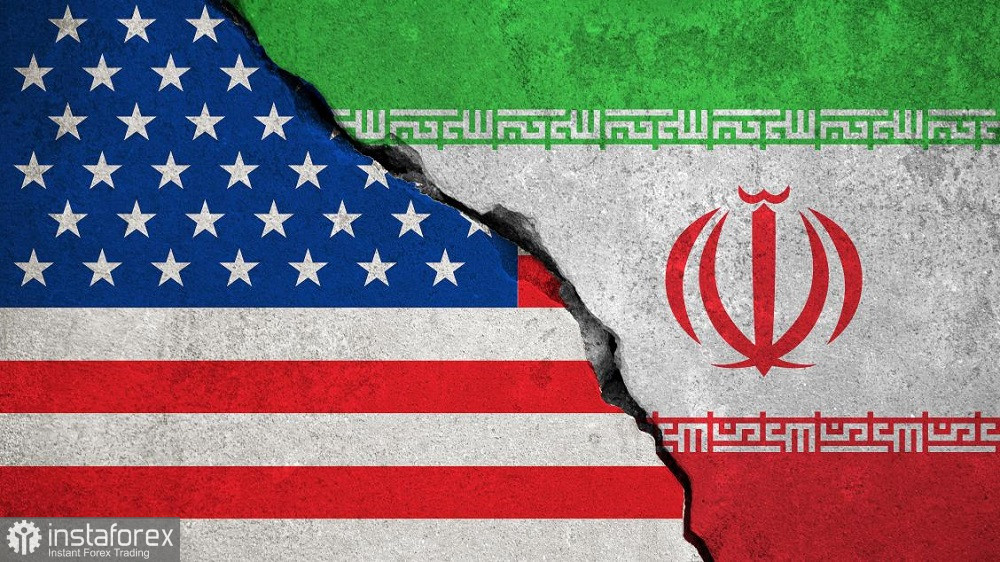The Euro-Dollar pair is slowly sliding down at the start of the new trading week. Against the backdrop of an almost empty economic calendar (with only the speech of ECB Vice President Luis de Guindos among significant events), the dollar is benefiting from increased demand. The U.S. Dollar Index is attempting to regain its positions, taking advantage of general nervousness caused by heightened geopolitical tensions. And this time, it's much more serious than dealing with Yemeni Houthi rebels (although de-escalation is still far from here).
The morning, as they say, did not start with coffee but with an insider report from Bloomberg that the USA may attack Iran in response to the killing of three American soldiers by a drone strike on a military base on the border with Jordan. It's important to note that, according to official representatives of Tehran, Iranian military personnel have no connection to this attack. Nevertheless, the situation continues to escalate – as reported by U.S. media, pressure on Biden to confront Iran has "significantly increased" from the Republican Party.

In particular, Mississippi Senator Roger Wicker stated that the White House has come a time to act purposefully and decisively in response to attacks that tragically claimed the lives of American military personnel. Another Senator, Lindsey Graham, supported this position and stated that the U.S. should strike important targets within Iran "not only as retaliation for the killing of soldiers but also as a deterrent against future aggression." Similar statements were made by a Senator from Arkansas, the Chairman of the House Armed Services Committee, and even the Speaker of the House of Representatives, Mike Rogers (who, incidentally, is the third person in the hierarchy of the U.S. political system).
One of the options being discussed (according to leaked information) is to strike Iran without declaring it or to attack Iranian officials.
However, it's essential not to forget that the U.S. has essentially started the pre-election campaign, even though the presidential elections are still ten months away. The immigration issue is not the only one that Republicans are promoting, setting political traps for Joe Biden. As known, the President of the United States has broad powers in determining foreign policy, so here, the "elephants" (elephant, as Americans know, is the symbol of the Republican Party) are also ready to play their card. From a political point of view, this option is fail-safe: if Biden does not opt for a military response (which is more likely), it means "showing weakness, not responding to the killing of American citizens." If a response does follow, it can be deemed insufficient, and once again, accuse the head of the White House of indecisiveness.
Donald Trump, commenting on the strike on the American military base, stated that such a thing would "never have happened and would have happened" during his presidency. From this, it can be concluded that Republicans will continue to pressure Biden on this issue (at least for political reasons), voicing loud calls for "retribution." Moreover, the activities of the Yemeni Houthi rebels are also linked to Tehran: last week, the head of the U.S. Central Command Navy stated that "Iran is directly involved in Houthi attacks in the Red Sea."
All of this indicates that geopolitical tension will persist in the near future – there are no prerequisites for de-escalation at the moment. Therefore, the safe haven dollar will enjoy increased demand as a protective asset.
Additional pressure on the EUR/USD pair was exerted by the conflicting rhetoric of ECB representatives. On the one hand, Central Bank Vice President Luis de Guindos stated that the regulator would lower interest rates only when they are sure that inflation would reach the 2% target. On the other hand, Governing Council member Mario Centeno voiced quite dovish messages, stating that the reduction of interest rates "should begin sooner rather than later." According to him, inflation is steadily declining, while almost all factors that contributed to rising prices have weakened. He added that there is no need to wait for wage data in May to make a decision on monetary policy easing.
Thus, the EUR/USD pair is currently testing the support level of 1.0820 (the lower line of the Bollinger Bands indicator on the daily chart) against the backdrop of an almost empty economic calendar but due to loud geopolitical events. Centeno also added fuel to the fire, practically allowing a reduction in interest rates in early spring. If the bears push the EUR/USD below the support level of 1.0820, the next target for the downward movement will be the 1.0750 target – the lower boundary of the Kumo cloud on the D1 timeframe.
 English
English 
 Русский
Русский Bahasa Indonesia
Bahasa Indonesia Bahasa Malay
Bahasa Malay ไทย
ไทย Español
Español Deutsch
Deutsch Български
Български Français
Français Tiếng Việt
Tiếng Việt 中文
中文 বাংলা
বাংলা हिन्दी
हिन्दी Čeština
Čeština Українська
Українська Română
Română

